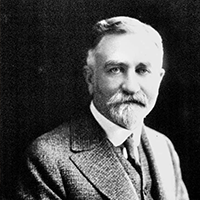Herbert Henry Dow
Herbert Henry Dow was a Canadian-born American chemical industrialist, best known as the founder of the American multinational conglomerate Dow Chemical. He was a graduate of Case School of Applied Science in Cleveland, Ohio.
Dow first became interested in brines (concentrated solutions of salts and water) while attending Case School of Applied Science (now Case Western Reserve University) in Cleveland (B.S.; 1888). His analysis of brines from several sites revealed that those of Canton, Ohio, and Midland, Mich., were rich in bromine. He developed and patented electrolytic methods for extracting bromine from brine and in 1890 organized the Midland Chemical Company. The Dow process was remarkable in that it did not result in a salt by-product and that it operated on comparatively little fuel, which was provided by waste from the then-thriving Michigan lumber industry. The process also involved the first commercially successful use of the direct-current generator in the American chemical industry.
In 1895 Dow founded the Dow Process Company to electrolyze brine for chlorine (producing caustic soda and sodium hypochlorite) at Navarre, Ohio, soon moving the company to Midland and creating the Dow Chemical Company (1897) to absorb the Midland Chemical and Dow Process. Dow’s chlorine products found application in insecticides and (through the electrolysis of magnesium chloride) stucco and magnesium metal. He further introduced automatic processing to produce magnesium sulfate (Epsom salts) from ocean brines, produced the first synthetic indigo process in the Western Hemisphere (1916), and was the first American producer of iodine (which he also extracted from brine). He eventually was granted some 65 patents as his company became one of the world’s leading chemical manufacturers.

Herbert Henry Dow
Date of Birth: 26 Feb 1866
Birth Place: Belleville, Canada
Proffession: American-Canadian industrialist
Nationality: American-Canadian
Death: 15 October 1930, Midland, Michigan, United States


